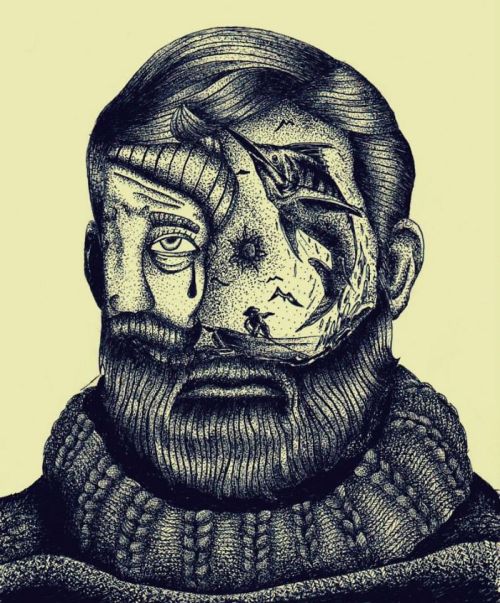"The Prudence Of Hemingway"
Like any other
extraordinary writer
he had a slight
personality disorder
His prose helped
to mitigate the burden
hereditary sickness
is like living with
an overzealous bully
I salute the man
for knowing when
to replace the pen
with the double barrel
A two time loser
is twice efficient
he saved his legacy
by squeezing
the trigger
Hemingway
had sense enough
to know when
the time had come
Yet you feel
justified by
perpetuating
what should
have never
been started
Living out
your welcoming
scribbling past
the date of expiration

Ernest Hemingway -- Vedran Štimac
As he was finishing "A Farewell to Arms" in 1928, Ernest Hemingway learned that his father had shot himself in the head with a Civil War revolver. In 1939, as part of a publicity campaign on behalf of the Sun Valley Resort, outside of Ketchum, Idaho, be became friends with Gene Van Guilder, who died in a hunting accident; Hemingway wrote, "He loved the warm sun of summer and the high mountain meadows, the trails through the timber and the sudden clear blue of the lakes. He loved the hills in the winter when the snow comes. Best of all he loved the fall ... the fall with the tawny and grey, the leaves yellow on the cottonwoods, leaves floating on the trout streams and above the hills the high blue windless skies. He loved to shoot, he loved to ride and he loved to fish. Now these are all finished. But the hills remain." During his visit he finished "For Whom the Bells Toll;" its hero, his leg crushed under a wounded horse, fought the temptation to kill himself as he waited for the enemy to capture and torture him ("I don't want to do that business that my father did.... I'm against that.... So why wouldn't it be all right just to do it now and then the whole thing would be over with? ... I think it would be all right to do it now? Don't you?" Then, in italics: "No, it isn't. Because there is something you can do yet.")
ReplyDeleteHemingway returned to hunt and write every fall until 1949, then stayed away until 1958. After winning the 1954 Nobel Prize ("How simple the writing of literature would be if it were only necessary to write in another way what has been well written. It is because we have had such great writers in the past that a writer is driven far out past where he can go, out to where no one can help him") it had become increasingly more difficult for him to finish his work, and his style had become notably flabbier than that which had brought him fame and fortune. In 1959 he bought a modest home in Ketchum. By then he had survived a serious injury in World war I, two plane crashes in Africa (the plane that had been sent to rescue him also burned on take-off), several shark-hunting accidents, multiple car and motorcycle crashes, at least a dozen concussions, and decades of chronic alcoholism. He told the movie star Ava Gardner, who starred in the 1952 adaptation of his short story, "The Snows of Kilimanjaro," "I spend a hell of a lot of time killing animals and fish so I won't kill myself." In Ketchum he worked on new books, such as "The Garden of Eden" and "A Movable Feast," which, heavily edited, would be published long afterwards, and cried when he was unable to contribute even one sentence to a presentation volume for John F. Kennedy's inauguration in January 1961. In November 1960 his fourth wife had him committed to the Mayo Clinic, where he received electroconvulsive shock treatment that did not cure his depression but made him lose his memory and gave him paranoid delusions. In April 1961 she found him sitting with a shotgun and two shells and sent him to a hospital in Ketchum, but he tried twice more to end his life, once by trying to walk into the propeller of a plane taxiing on the runaway. After months of hospitalization he was sent home. To celebrate he drank wine at a picnic lunch (and was convinced that some state troopers he saw wanted to arrest him for possession of alcohol) and, the next morning, 2 July, he got up early, put on a dressing gown that he called his "emperor's robe," unlocked the door of the storage room where he kept his firearms, loaded two shells into his favorite shotgun, and at 7 AM shot himself in the forehead with both barrels, in the foyer of his home, a few weeks before his 62nd birthday. His brother Leicester claimed that, "like a samurai who felt dishonored by the word or deed of another, Ernest felt his own body had betrayed him;" in 1982, Leicester, a diabetic faced with the loss of his legs, shot himself in the head. Three of Clarence's six children took their own lives. Ursula, the sister of Ernest and Clarence, died from a drug overdose in 1966. Ernest's granddaughter, model/actress Margaux, was found dead from a phenobarbital overdose on 1 July 1996. Ernest's memorial in Ketchum reads: "Best of all he loved the fall/ The leaves yellow on the cottonwoods/ Leaves floating on the trout streams/ And above the hills/ The high blue windless skies/ Now he will be a part of them forever."
ReplyDelete